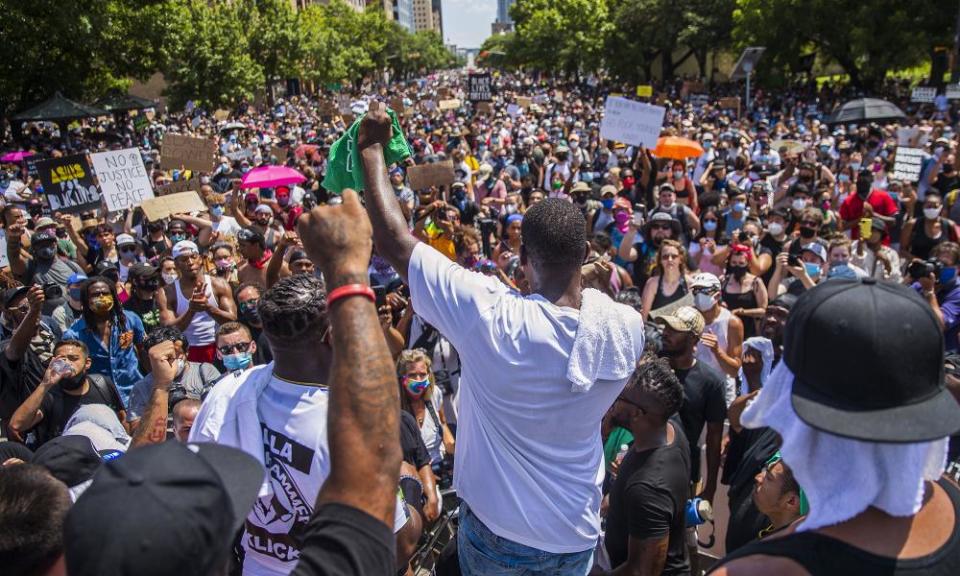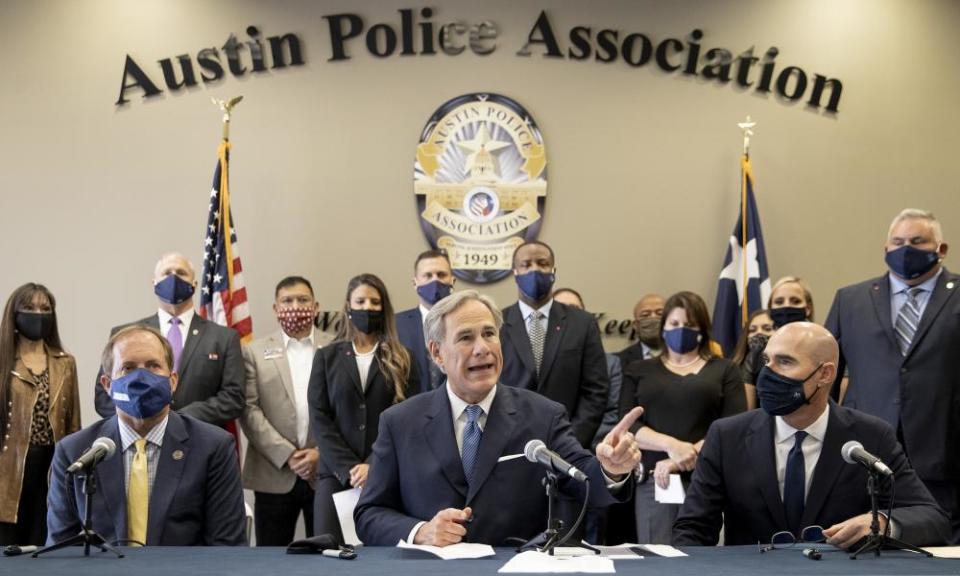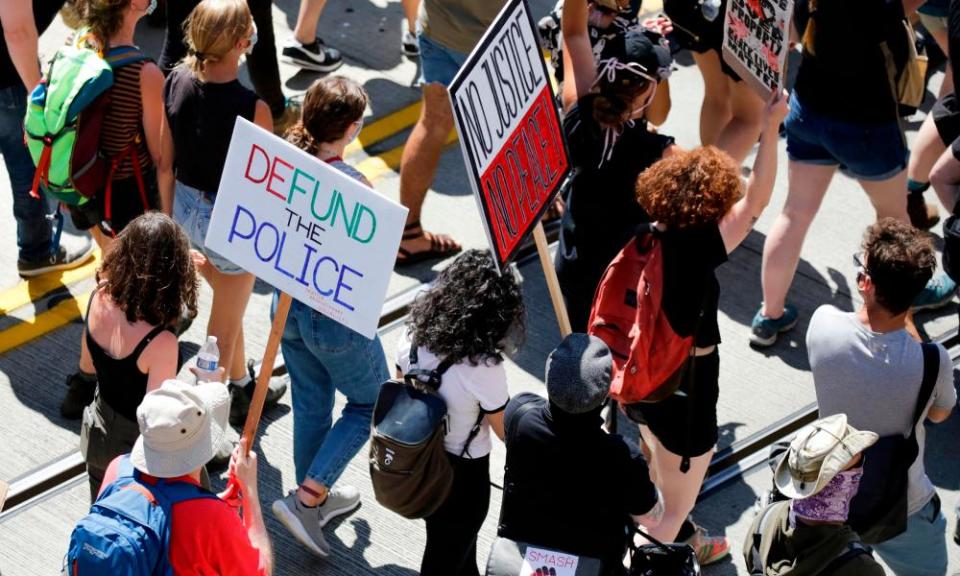These US cities defunded police: 'We're transferring money to the community'
After “defund the police” became the rallying cry of protests last summer, Democratic leaders spent months criticizing the slogan and worrying about its impact on elections. While party infighting was dominating headlines, local activists were campaigning to make the catchphrase a reality in cities across the US.
Since the killings of George Floyd and Breonna Taylor prompted unprecedented uprisings, some racial justice groups have successfully pressured municipal lawmakers to cut police funds and reinvest the money in services. And with reformed 2021 budgets coming into effect, cities are slowly beginning to redistribute law enforcement money to housing, mental health programs, food access and other programs.
“We are showing the country how reinvestments from the police budget can actually make many people’s lives so much better and safer,” said Gregorio Casar, a councilmember in Austin, Texas, who helped pass a major cut to the city’s law enforcement budget and is now reallocating those dollars to housing programs. “This will build momentum for changes to police budgets across the country.”
Related: Rodney King: 30 years after brutal beating, activists say LAPD 'still corrupt and violent'
More than 20 major cities have reduced their police budgets in some form, an unprecedented trend, though the scale and circumstances vary dramatically. The activists who have long campaigned to take money from US police are now fighting to ensure that the initial cuts are only the start – and that a growing backlash from law enforcement, elected officials and some community groups does not derail their progress.
A ‘paradigm shift’: $870m cut from police
For years, local advocacy groups have packed city hall meetings, demanding “jobs not jails”, “care not cops” and “books not bars” – urging officials to stop expanding budgets for police and jails. They have argued that cities should instead prioritize the programs that have been defunded over the years that would address root causes of crime and poverty, like education, healthcare and homeless services.
Local lawmakers largely ignored activists’ pleas, and police spending has tripled over the last 40 years, helping to make the US a world leader in incarceration and police killings. Even as cities have faced financial shortfalls, local governments consistently spent an increasing share of their general funds on police (despite repeated research showing that increasing police funding does not correlate to reduced crime).
The dynamics suddenly changed last summer during massive Black Lives Matter demonstrations after video emerged of a Minneapolis officer pressing his knee on George Floyd’s neck for almost nine minutes.

“Everyone on the street provided a new window into understanding and defining the problem of police brutality,” said Nikki Jones, a professor of African American studies at the University of California, Berkeley, who described a “paradigm shift” in conservations about police and systemic racism.
Previously, she explained, political debates focused on “bad apples” and “implicit bias” – the ideas that brutality cases were isolated incidents and that law enforcement could be reformed with better training. But the uprisings brought mainstream attention to abolitionist arguments that the problems are institutional, and that the only way to reduce harm is to take power and funding away from police.
With public pressure on them, mayors and city councils responded. In 2020 budget votes, advocacy groups won over $840m in direct cuts from US police departments and at least $160m investments in community services, according to an analysis by Interrupting Criminalization, an initiative at the Barnard Center for Research on Women. In 25 cities, such as Denver and Oakland, officials moved to remove police from schools, saving an additional $34m.
“Folks might look at $840m as a drop in the bucket of the $100bn we spend on police each year, but it definitely reverses the trend of constantly increasing police budgets over the past many decades,” said Andrea J Ritchie, one of the Barnard researchers, “and it did so in a way that also secured the transfer of funds from policing to community-based safety strategies.”
In some cases, the cuts came from leaving vacant positions unfilled or moving the accounting of certain police functions to other agencies – changes that would probably have minimal immediate impact. Other city leaders said their cuts were due to the Covid-19 economic crisis and not the protests, and in 26 major cities, lawmakers continued to increase police budgets.

But for cities that did intentionally pass cuts, some of the changes were significant. Portland, Oregon, cut $15m from its budget and disbanded a gun violence reduction unit and transit team that had both long been accused of over-policing Black communities. San Francisco officials pledged to divest $120m from police over two years with plans to invest in health programs and workforce training. Minneapolis is using police cuts to launch a mental health team to respond to certain 911 calls.
New York, Los Angeles, Chicago, Seattle, Milwaukee, Philadelphia, Baltimore and a dozen other cities have all also reduced police spending. And some of these cities are now demonstrating the impacts of their new budgets.
How Austin is spending police funds
Austin, Texas, has made some of the most dramatic changes in the country, directly cutting roughly $20m from the police department, and moving $80m from the agency by shifting certain services out of law enforcement. The city has gone from spending 40% of its $1.1bn general fund on police to now allocating about 26% to law enforcement.
“Public health and public safety are at the heart of this,” said Chris Harris, the criminal justice director at Texas Appleseed, a local not-for-profit. “When we take policing away, we are actually filling that void with alternatives that we know are going to help.”
The Austin police funds were reallocated to emergency medical services for Covid-19, community medics, mental health first responders, services for homeless people, substance abuse programs, food access, workforce development, abortion services, victim support, parks and more. The city council is using money saved from the police budget to buy two hotels to provide supportive housing for homeless residents.
“For decades, Austin has spent so many dollars policing homelessness, jailing the homeless, and paying for emergency rooms and 911 calls instead of reinvesting those same dollars to finally start reducing homelessness,” said Casar, the local councilmember. “By adjusting the police budget even just a little bit, we are going to be able to house and help hundreds of people with these two hotels … and I hope we’ll be able to buy more.”
Austin has started redirecting certain 911 calls to mental health professionals – a move meant to provide help to those crises instead of a potentially deadly response by police, Casar said: “We know that we can solve the mental health crisis with treatment and care, not with handcuffs and jail.”
The redirected funds are also meant to benefit the crime victims who have been traditionally neglected and mistreated by law enforcement, advocates said.
Marina Garrett, a 25-year-old Austin resident and supporter of the defund efforts, has spoken out about how police mishandled her rape case. After she reported that she was sexually assaulted in 2015 at age 19, she submitted to a forensic exam, but detectives didn’t move forward while awaiting results for her rape kit, which was affected by a huge backlog.
We can’t just keep throwing money at police and expect them to change their ways and culture
Marina Garrett
During that time, the police forensic lab shut down amid claims of misconduct and incompetence, and Garrett’s case dragged on: “It was completely devastating. You wake up every day, and it’s all you can think about. My whole life was on pause for two years.”
It took two years for the results to come back, and ultimately police and prosecutors did not move forward with a case: “I started to realize that police were no help … and that police were making survivors wish they had not come forward,” said Garrett, who is part of a class-action lawsuit against Austin police.
With reinvested police funds, Austin is now moving forward with a new independent forensic science department. Garrett and other survivors have long pushed for the change. She said it was a small step to reduce some of police’s jurisdiction over sexual assault survivors, but that law enforcement remained largely ill-equipped to support victims.
“We can’t just keep throwing money at police and expect them to change their ways and culture, which is sexist and racist,” she said. “There are groups that are trained to provide support to survivors and help them find healing and justice, separate and apart from police.”
Alicia Dean, a city spokesperson, declined to comment on Garrett’s case, but said the police department supported the change in forensics, adding in a statement, “the city is committed to improving best practices and outcomes of sexual assault reporting, processing, investigations and prosecutions. We want all victims to feel safe, heard and have confidence in every step of the process.”
Fighting the backlash and ‘fear mongering’
One of the greatest obstacles to defunding law enforcement agencies are powerful police unions, which have long opposed reforms and negotiated strong protections in their contracts that typically make it impossible for cities to terminate or lay off officers.
Unions have launched aggressive PR campaigns to counter the movement. In Austin, the Texas Municipal Police Association (TMPA) created highway billboards saying “Warning! Austin Police Defunded, Enter at Your Own Risk” and “Limited Support Next 20 Miles” – and put up the signs in September, before the new budget had gone into effect.
The Republican governor of Texas, Greg Abbott, has also repeatedly threatened to try to force Austin to restore its police budget through legislation, and other state Republicans have spread misinformation about crime rates in the city.

“There are attempts to play up perceived dangers and to associate it with changes in the budget, without evidence,” said Harris. “A lot of the fearmongering that comes out of law enforcement is designed to play up racial tensions and racist myths.”
Cities across the US that have made modest progress on defunding are facing similar resistance. In Seattle, councilmembers initially pledged to meet activists’ demands and cut the police budget by 50%, but ultimately backtracked amid intense police opposition, passing a reduction of about 18% (by leaving vacancies unfilled and moving certain functions, like parking enforcement, out of the police budget).
Councilmember Kshama Sawant, a socialist who supported the 50% defunding, said it was particularly disappointing for the city to maintain high rates of police spending in a budget that made cuts to affordable housing, parks, libraries and transportation. Communities of color hurt by those cuts are the same people most targeted by police violence, she added.
A lot of the fearmongering that comes out of law enforcement is designed to play up racial tensions and racist myths
Chris Harris
“Tens of thousands of people in our city are reeling from the Covid crisis and the recession,” she told the Guardian, “but we have no hiring freeze for police.”
Sadé A Smith, a Seattle civil rights attorney, said it was hard to see the budget changes get watered down: “While they are playing these bureaucratic games, people are suffering. That’s what’s so frustrating. It took so many days of marching and an unprecedented uprising to even get this little bit.”
While there has been aggressive resistance to defunding from law enforcement associations and elected allies, there are also community organizations and local residents who have expressed doubts or concerns.
The Rev Harriet Walden, a Seattle advocate who has long fought for police accountability, said she was worried about rising crime rates and feared defunding efforts could leave some Black communities and victims of violence vulnerable: “Crime is escalating … and people aren’t going to get arrested or charged.”
Walden said she supported reforms that made it easier to fire officers who violate policies or brutalize people, but that she didn’t want fewer police overall.

Sybrina Fulton, the mother of Trayvon Martin, the teenager killed by a neighborhood watch volunteer, also said she would rather see more police officers with better standards, instead of defunded departments. Merchants and business groups, too, have organized against defunding in some cities.
Ritchie, the Barnard researcher, noted that the activists leading the local defunding efforts were survivors of violence themselves and that they have made significant progress doing outreach and education, explaining to residents that “cities have for years been defunding housing, healthcare, job programs, libraries, arts and culture and violence prevention programs”.
People are often supportive once they understand that defunding police is about re-funding those services and making proactive investments in public safety and health. Activists across different cities were also learning from each other and recently launched a national website to pool together resources and put them in a better position to push for changes in the upcoming budget cycle, she said.
“Organizers are better prepared and armed with shared strategies and much bolder and more detailed visions.”
“Folks are getting ready and coming back for much, much more.”

 Yahoo Finance
Yahoo Finance 